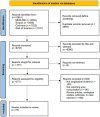Association between wine consumption and cancer: a systematic review and meta-analysis
- PMID: 37731399
- PMCID: PMC10507274
- DOI: 10.3389/fnut.2023.1197745
Association between wine consumption and cancer: a systematic review and meta-analysis
Abstract
Background: Alcohol consumption is related to the risk of developing different types of cancer. However, unlike other alcoholic beverages, moderate wine drinking has demonstrated a protective effect on the risk of developing several types of cancer.
Objective: To analyze the association between wine consumption and the risk of developing cancer.
Methods: We searched the MEDLINE (through PubMed), Scopus, Cochrane, and Web of Science databases to conduct this systematic review and meta-analysis. Pooled relative risks (RRs) were calculated using the DerSimonian and Laird methods. I2 was used to evaluate inconsistency, the τ2 test was used to assess heterogeneity, and The Newcastle-Ottawa Quality Assessment Scale were applied to evaluate the risk of bias. This study was previously registered in PROSPERO, with the registration number CRD42022315864.
Results: Seventy-three studies were included in the systematic review, and 26 were included in the meta-analysis. The pooled RR for the effect of wine consumption on the risk of gynecological cancers was 1.03 (95% CI: 0.99, 1.08), that for colorectal cancer was 0.92 (95% CI: 0.82, 1.03), and that for renal cancer was 0.92 (95% CI: 0.81, 1.04). In general, the heterogeneity was substantial.
Conclusion: The study findings reveal no association between wine consumption and the risk of developing any type of cancer. Moreover, wine drinking demonstrated a protective trend regarding the risk of developing pancreatic, skin, lung, and brain cancer as well as cancer in general.
Systematic review registration: https://www.crd.york.ac.uk/prospero/display_record.php?ID=CRD42022315864, identifier CRD42022315864 (PROSPERO).
Keywords: adult people; alcohol consumption; cancer; systematic review and meta-analysis; wine.
Copyright © 2023 Lucerón-Lucas-Torres, Cavero-Redondo, Martínez-Vizcaíno, Bizzozero-Peroni, Pascual-Morena and Álvarez-Bueno.
Conflict of interest statement
The authors declare that the research was conducted in the absence of any commercial or financial relationships that could be construed as a potential conflict of interest.
Figures






Comment in
-
Commentary: Association between wine consumption and cancer: a systematic review and meta-analysis.Front Nutr. 2024 Feb 21;11:1335731. doi: 10.3389/fnut.2024.1335731. eCollection 2024. Front Nutr. 2024. PMID: 38450232 Free PMC article. No abstract available.
Similar articles
-
Folic acid supplementation and malaria susceptibility and severity among people taking antifolate antimalarial drugs in endemic areas.Cochrane Database Syst Rev. 2022 Feb 1;2(2022):CD014217. doi: 10.1002/14651858.CD014217. Cochrane Database Syst Rev. 2022. PMID: 36321557 Free PMC article.
-
Association Between Wine Consumption and Cognitive Decline in Older People: A Systematic Review and Meta-Analysis of Longitudinal Studies.Front Nutr. 2022 May 12;9:863059. doi: 10.3389/fnut.2022.863059. eCollection 2022. Front Nutr. 2022. PMID: 35634389 Free PMC article.
-
Geographical Disparities in Pooled Stroke Incidence and Case Fatality in Mainland China, Hong Kong, and Macao: Protocol for a Systematic Review and Meta-analysis.JMIR Res Protoc. 2022 Jan 18;11(1):e32566. doi: 10.2196/32566. JMIR Res Protoc. 2022. PMID: 35040797 Free PMC article.
-
Association between Wine Consumption with Cardiovascular Disease and Cardiovascular Mortality: A Systematic Review and Meta-Analysis.Nutrients. 2023 Jun 17;15(12):2785. doi: 10.3390/nu15122785. Nutrients. 2023. PMID: 37375690 Free PMC article. Review.
-
The impact of moderate wine consumption on the risk of developing prostate cancer.Clin Epidemiol. 2018 Apr 17;10:431-444. doi: 10.2147/CLEP.S163668. eCollection 2018. Clin Epidemiol. 2018. PMID: 29713200 Free PMC article. Review.
Cited by
-
Commentary: Association between wine consumption and cancer: a systematic review and meta-analysis.Front Nutr. 2024 Feb 21;11:1335731. doi: 10.3389/fnut.2024.1335731. eCollection 2024. Front Nutr. 2024. PMID: 38450232 Free PMC article. No abstract available.
References
-
- Foreman KJ, Marquez N, Dolgert A, Fukutaki K, Fullman N, McGaughey M, et al. . Forecasting life expectancy, years of life lost, and all-cause and cause-specific mortality for 250 causes of death: reference and alternative scenarios for 2016-40 for 195 countries and territories. Lancet. (2018) 392:2052–90. doi: 10.1016/S0140-6736(18)31694-5, PMID: - DOI - PMC - PubMed
-
- Global Burden of Disease 2019 Cancer Collaboration. Kocarnik JM, Compton K, Dean FE, Fu W, Gaw BL, et al. . Cancer incidence, mortality, years of life lost, years lived with disability, and disability-adjusted life years for 29 cancer groups from 2010 to 2019: a systematic analysis for the global burden of disease study 2019. JAMA Oncol. (2022) 8:420–44. doi: 10.1001/jamaoncol.2021.6987, PMID: - DOI - PMC - PubMed
-
- Kuderer NM, Choueiri TK, Shah DP, Shyr Y, Rubinstein SM, Rivera DR, et al. . Clinical impact of COVID-19 on patients with cancer (CCC19): a cohort study [published correction appears in lancet. 2020 Sep 12;396(10253):758]. Lancet. (2020) 395:1907–18. doi: 10.1016/S0140-6736(20)31187-9, PMID: - DOI - PMC - PubMed
Publication types
LinkOut - more resources
Full Text Sources

